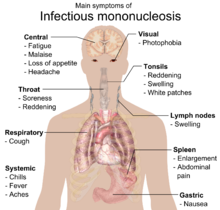Infectious mononucleosis is a common infectious disease that affects teenagers and young adults. The nickname “Kissing Disease” sounds rather funny, but getting sick with mononucleosis- and the affected persons may not have been kissed at all! – is no fun. The virus can leave the patient unwell and lethargic for several weeks. Missing study hours or being unable to work can be a bad set back.
There is no vaccination against the Epstein-Barr virus, which is the culprit in mononucleosis, and as it is the case with viral illnesses, antibiotics are of no use. The approach so far has been the treatment of symptoms: take over-the counter medicine to bring down a high temperature, drink fluids, use an over-the counter remedy to help against a sore throat and rest. In time mononucleosis would resolve.
Dr. Henry Balfour, who is a herpes specialist at the University of Minnesota, investigated the antiviral drug acylovir (Valtrex) as an intervention for documented Epstein-Barr infections. Students who presented with symptoms of Mononucleosis within 7 days of onset were receiving 3g of valacylovir per day for 2 weeks. Samples of saliva showed a two-fold decrease of the virus load in 8 out of 10 patients. Only one student who had been untreated showed the same result. This effect points to the possibility of reducing or eliminating oral virus transmission by administering Valtrex. The other effect was a decrease in the severity of the illness. The group on medication got better faster. Dr. Balfour pointed out that the current study does have some limitations, due to the small number of participants.
He hopes to study the effect of another antiviral agent, valganciclovir (Valcyte) that has a longer intracellular half-life and for this reason should be even more effective.
More information on infectious mononucleosis: http://nethealthbook.com/ear-nose-and-throat-diseases-otolaryngology-ent/throat-problems/infectious-mononucleosis/
Reference: The Medical Post, page 1, 61, January 10, 2006
Last edited October 30, 2014






